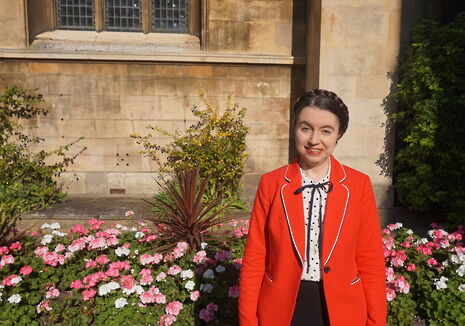Victoria Bateman on ‘the cult of female modesty’
Belle George talks to the Caius economics fellow about taboos around the body and the effect these have on mental health, particularly in Cambridge

Content note: mention of eating disorders, anxiety
Dr Victoria Bateman met me at the Caius Porters’ Lodge on one of this autumn’s most glorious days. Bright blue skies contrasted with the foliage of Caius’ aptly named ‘tree court’. Before heading to her office on the other side of Trinity Street, she gave me a quick tour around the inner courtyards of the college where she completed her undergraduate degree and where she now works as an economics fellow. Walking around the courts she points out the window of the room she lived in during her final year. It’s apparent this woman feels at home in one of Cambridge’s oldest colleges.
Back in her office, Bateman tells me her experience since returning to Cambridge has been “broadly positive.” “In many ways on the face of it [Caius] hasn’t changed and there’s been this pull of history and of tradition, but in many ways I’ve actually found it to be an immensely progressive and supportive place when it comes to my own female activism.”
"The whole idea of body versus brain really underlies a top university like Cambridge"
Bateman has attracted much publicity in recent years for staging a series of naked protests in objection to Brexit, the lack of focus on women in economics and the sexual objectification of women’s bodies. She points out an ornament on her mantlepiece which she recently bought during a trip to New York. It reads ‘well behaved women rarely make history’ - fitting for a woman who has repeatedly chosen to violate the old maxim that ‘nude is rude’.
Bateman tells me that with regards to her naked protests, “the most supportive and open minded response has definitely been in Cambridge.” At other events she has received a considerably colder response. Those who respond worst to her protests, she says, tend to be other women.
At an all-female talk about women and art the naked Bateman was told to cover up after about fifteen minutes because “a couple of men might be coming.” At this, she was indignant. “You can’t talk about women and art and not bring up women’s bodies! The greatest depiction of women in art throughout history has been of their bodies and we can’t just ignore that. We need to confront it and think about it.”
She recalls a naked protest she staged last Easter at a “pretty high profile” economics conference, protesting “economists neglect of women’s bodies and their relevance, for example of the lack of reproductive rights, access to birth control, the rights of sex workers and the hypocrisy of how as a society we are happy with women monetising their brains, but not their bodies.” Again, she experienced backlash against her protest, not from the male economists present, but the women.
“For the first few minutes it was going fine, I was chatting to people, and then a very senior female economist came down on me like a tonne of bricks. She said [my protest] was a disservice to women in the economics profession and I was told that unless I stopped that she would have to consider cancelling the session that I was due to speak in the next day.”
"The more we see the body in a non-sexualised context, the more we stop associating women’s bodies just with sex"
This example highlights something Bateman herself spoke of in her recent lecture on feminism and economics organised by the Cambridge Society for Economic Pluralism. Women can themselves be complicit in the enforcement of social norms and practices that keep women in their place. This dynamic is still prevalent within the feminist tradition, despite the valiant efforts made by intersectional feminists to recognise and eradicate it. Bateman recalls that when she was a “younger feminist” she was “very aware of the whole issue of men versus women.” However with age and experience in protesting, she has “seen this resistance from other women, particularly when we use our bodies in a way that is not considered as conforming to the ideals of being a feminist.”
The notion that women should fight to have their brains recognised and their bodies ignored can be observed in some strains of both feminism and economics. Bateman outlines the problem as she see it: “As young, intelligent women we are taught from a young age that if someone sees our body, if we show off too much of body, that will undermine the way that people think of us, that that will make people see us as less worthy, less valuable and that that will detract from our brain.” Bateman calls this phenomenon “the cult of female modesty”, and says it can be “extremely dangerous”, creating “a lot of anxieties in our everyday life about this feeling that if we have a loose button on our blouse or if our skirt blows up – we have a constant worry about what you are or are not revealing about your body.”
We progress to speaking about this “cult of female modesty” in the context of Cambridge. Bateman had watched Varsity’s recent video where current students talked about body image at university. “It really pulled at my heartstrings,” she says. Bateman recalls her own experiences as a student and in her twenties. “I felt increasingly disconnected from my body and therefore quite anxious and uncomfortable, and quite unhappy with myself as a person as a result.”
It’s easy for this to happen at Cambridge, she explains, where there is an assumption that “we’re here because of our brains so it’s as if we can completely ignore what is going on with our bodies.” This dismissive attitude towards the body can be seriously damaging, she says. “The whole idea of body versus brain really underlies a top university like Cambridge which might not be aware of and might not acknowledge the issues that this creates.”
Bateman insists that Cambridge’s attitude towards the body must change. “I think the very first thing Cambridge can do is to admit and face up to the fact that there is a problem – that many students do suffer with issues surrounding disordered eating, body image, a lack of confidence.”
However, she acknowledges that the root of the problem lies much deeper than the academic realm. “There is a wider society problem which is that, particularly in a modest country like Britain, the only time that we see other women’s bodies is in advertising or in pornography. As a result we don’t really see ‘normal’ women’s bodies. We just see them in a sexualised context.”
The solution? “The more we see the body in a non-sexualised context, the more we stop associating women’s bodies just with sex.” Bateman argues we need to challenge taboos around the body. “Now I’m not saying that everyone should throw off their clothes and walk down the street naked – although I would be happy to join anyone who did – but I think if you look at some other countries like Scandinavia… where people are happy swimming naked, bathing in the sunshine naked, where people are used to seeing all the different body shapes and sizes around us from a young age; I think that generates a much healthier relationship between ourselves and our bodies.”
She laughs, quipping “a hundred years ago we associated women’s ankles with sex because they were only ever seen in the bedroom, and now - we can show our knees even!” Becoming serious again, she concludes that while “a lot of the problem is rooted in society”, issues of body image become a particular issue at university, where “any anxieties that we have about our bodies and about eating become magnified in an environment of pressure and stress of a kind that Cambridge has.”
Three weeks into my second year at Cambridge and this conversation with Victoria Bateman was the first time I had heard an academic speak about the body, rather than the brain. Her open manner when discussing this typically taboo subject is refreshing. This is a woman who is not only willing to stand up for what she believes in, but willing to stand up... starkers.
 News / Reform candidate retracts claim of being Cambridge alum 26 January 2026
News / Reform candidate retracts claim of being Cambridge alum 26 January 2026 News / Report suggests Cambridge the hardest place to get a first in the country23 January 2026
News / Report suggests Cambridge the hardest place to get a first in the country23 January 2026 Interviews / Lord Leggatt on becoming a Supreme Court Justice21 January 2026
Interviews / Lord Leggatt on becoming a Supreme Court Justice21 January 2026 Comment / How Cambridge Made Me Lose My Faith26 January 2026
Comment / How Cambridge Made Me Lose My Faith26 January 2026 News / Cambridge psychologist to co-lead study on the impact of social media on adolescent mental health26 January 2026
News / Cambridge psychologist to co-lead study on the impact of social media on adolescent mental health26 January 2026









